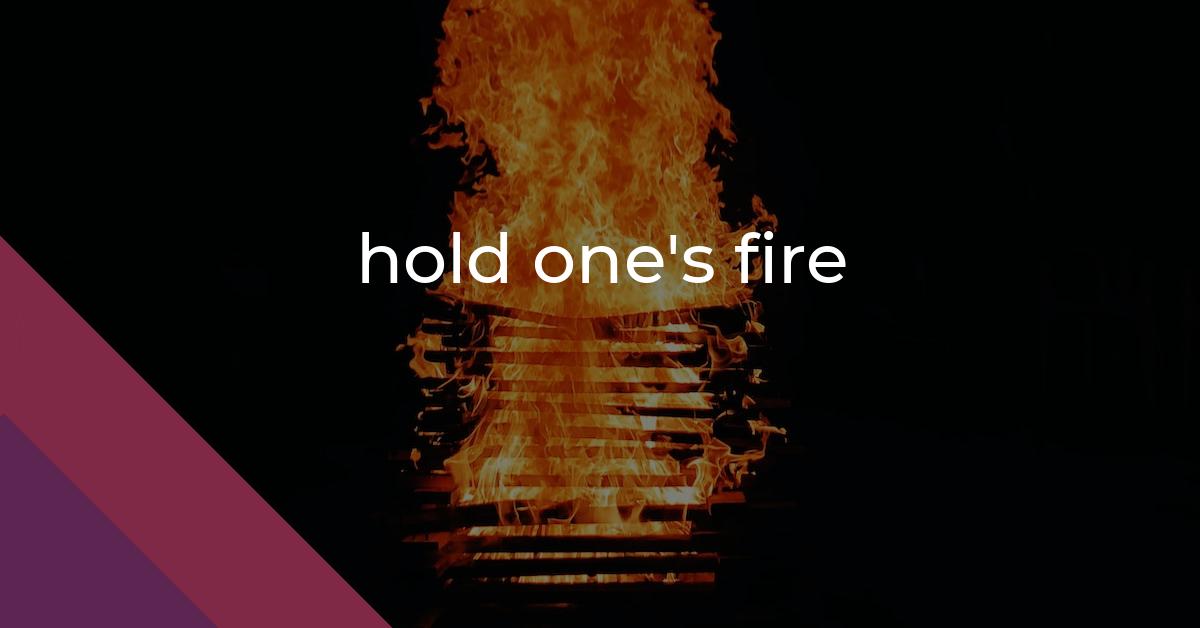hold one’s fire: Idiom Meaning and Origin
What does ‘hold one's fire’ mean?
The idiom "hold one's fire" means to refrain from taking action or making a comment in a situation where it may be expected or appropriate to do so. It is often used in a literal sense to refer to a command to soldiers to stop shooting.

Idiom Explorer
The idiom "keep shtum" means to remain silent or keep quiet about something, especially when it is important or could cause trouble if revealed.
The idiom "keep quiet" means to remain silent or not speak, especially when it is important to do so in order to maintain secrecy, avoid trouble, or not reveal information.
The idiom "keep one's mouth shut" means to remain silent or not reveal information, often to avoid causing trouble or trouble for oneself. It emphasizes the importance of not speaking or disclosing something that should remain secret or private.
The idiom "keep one's lips sealed" means to keep quiet or not reveal a secret or confidential information.
The idiom "hold the line" means to remain in a current position or keep a situation stable, often in the face of difficulty or opposition.
The idiom "hold the floor" means to continue speaking or dominating a conversation or discussion, often preventing others from speaking or interrupting.
The idiom "hold the cards" means to have the control or power in a situation.
The idiom "hold that thought" means to ask someone to temporarily stop speaking or delay a discussion until one is ready to continue or listen further.
The Tactical Advantage of Patience
hold one's peace is another idiom that is closely related to hold one's fire. It is often used interchangeably with hold one's fire to mean the same thing: to refrain from speaking or voicing one's opinion. While hold one's fire emphasizes the metaphorical idea of not taking action, hold one's peace specifically emphasizes the idea of not speaking.
The phrase hold one's peace has biblical origins and is derived from the King James Version of the Bible. It is often used in the context of legal proceedings or ceremonies, where individuals are expected to remain silent or not object to something being said or done. It can also be used in everyday conversations to encourage someone to remain quiet in order to avoid conflict or maintain harmony.
hold one's tongue is yet another related idiom that carries a similar meaning to both hold one's fire and hold one's peace. When someone is told to hold their tongue, it means that they should refrain from speaking or expressing their thoughts or opinions. This idiom implies a sense of self-control and the ability to keep quiet, even in difficult or frustrating situations.
Hold one's tongue can be used to signify a temporary or voluntary silence, or it can be used as a command or directive from someone in a position of authority. It is often used to advise someone to exercise caution or discretion in their speech, particularly when discussing sensitive or contentious topics.
Lastly, there is the idiom hold the line, which is also connected to hold one's fire. Hold the line is often used in the context of communication or telephone conversations. When someone is told to hold the line, it means that they should stay on the phone and wait for further instructions or information. It is a request for the person to remain connected and not hang up.
Hold the line can also be used more figuratively to mean holding a position or maintaining a stance, particularly in the face of opposition or challenges. It suggests the idea of resilience and perseverance, staying firm and not giving up when faced with difficulties or setbacks.
Overall, the idioms hold one's peace, hold one's tongue, and hold the line are all closely related to hold one's fire. Each phrase emphasizes the importance of restraint and self-control, whether it be in actions, speech, or communication. These idioms serve as reminders to think before acting, to remain silent when necessary, and to hold steady in the face of challenges.
Example usage
Examples:
- The commander ordered his troops to hold their fire until they received further instructions.
- During the heated debate, the moderator asked everyone to hold their fire and listen to each other's arguments.
- The detective decided to hold his fire and gather more evidence before making an accusation.
More "Command" idioms



